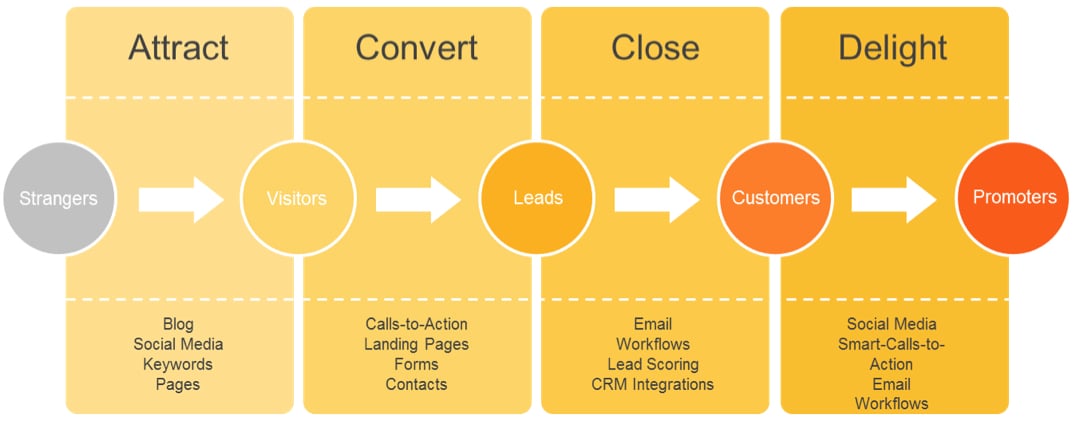BECOME W.I.S.E.R. with Your AI Prompts - A guide for sales managers
Everyone’s wittering on about AI like it’s the second coming. But here’s the rub: if you give it half-baked prompts, you’ll get half-baked answers....
2 min read
 Chris Fell
Updated on June 12, 2014
Chris Fell
Updated on June 12, 2014

The simple answer to this question is because the way your customers are buying is changing.
But here is the explanation. Multiple respected research firms such as Forrester, Gartner, The Corporate Executive Board and IDC are finding that today's buyer is "self serving," finding the information they need to help move along their buying cycle without any intervention from the vendor at all. Research has shown that B2B buyers are completing between 60-90% of their buying journey before contacting any vendors. They are downloading content, joining in discussions on social media, such as LinkedIn, watching videos, reading blogs and of course using search engines to surf directly to vendors sites. Building a content marketing strategy aligned around your buyers challenges and needs is table stakes for B2B businesses.
Marketing MUST build a multichannel content distribution plan to attract buyers and subsequently engage with them, carefully nurturing a lead, building a trusted relationship, until they are ready to engage with sales.
Marketing now owns a much larger part of the revenue generation cycle.
So why do sales get a disproportionate percentage of budget? The answer, I suspect, is purely historical. It makes complete sense to invest where the heavy lifting of revenue generation is taking place. That balance is now shifting.
Its time for an attitude adjustment from the person sitting in the big chair. Marketing needs a disproportionate share of the sales and marketing budget to attract and engage leads.
When we first meet business owners or senior execs in our client organisations there is often a resistance to this budget shift. Executives are wary of money disappearing down a big black hole. Who can blame them, marketing has been guilty of this for many, many years. But with smart (and increasingly affordable) marketing automation software, it is perfectly straightforward to link each and every tactic, email, whitepaper, ebook, landing page, PPC campaign precisely to the revenue it creates. In fact you should insist your marketers are able to demonstrate crystal clear ROI on everything they do.
But here is the really good news. If you embark on this scientific, analytical approach to marketing - Measure, Analyse, Adjust, Remeasure - Your salesteam also lifts its performance as they are feeding on better more qualified leads.
Business leaders need to challenge their marketers to build a clear process - a sequence of tactics and activity that attracts, converts and nurtures strangers into qualified leads in sufficient volume to meet your business goals.

If you think your team might struggle with this assignment we would be happy to perform a complementary marketing assessment with some helpful thinking and guidance to get you started.
This is a difficult questions to answer as it depends on where you are in your growth cycle and to some extend the sector from which you come. Research from Gartner suggests younger, smaller firms spend between 12 - 15% of revenue and larger more mature firms spend closer to 5-7% of revenue - The average was 10.4%.
Interestingly the proportion of that spend on digital marketing is increasing quickly according to IDC's CMO Advisory practice from around 25% to over a third of overall marketing budgets. The compound average growth rate over a 5 year period is over 17% growth per year. This trend is driven by firms understanding the lower cost of digital marketing (estimates put the cost per lead at about 60% lower) and its increasing effectiveness at cutting through and resonating with buyers.
If you need help with your marketing transformation why not start with this excel based health check tool that allows you to audit your current capabilities.
Subscribe to our latest news and updates on HubSpot.

Everyone’s wittering on about AI like it’s the second coming. But here’s the rub: if you give it half-baked prompts, you’ll get half-baked answers....

The business world is falling head over heels for AI—and who can blame it? With promises to reduce grunt work, uncover insights, and turbocharge...

Search is evolving - fast. For two decades, SEO has revolved around Google’s algorithm: keywords, backlinks, metadata, and page speed. But with the...